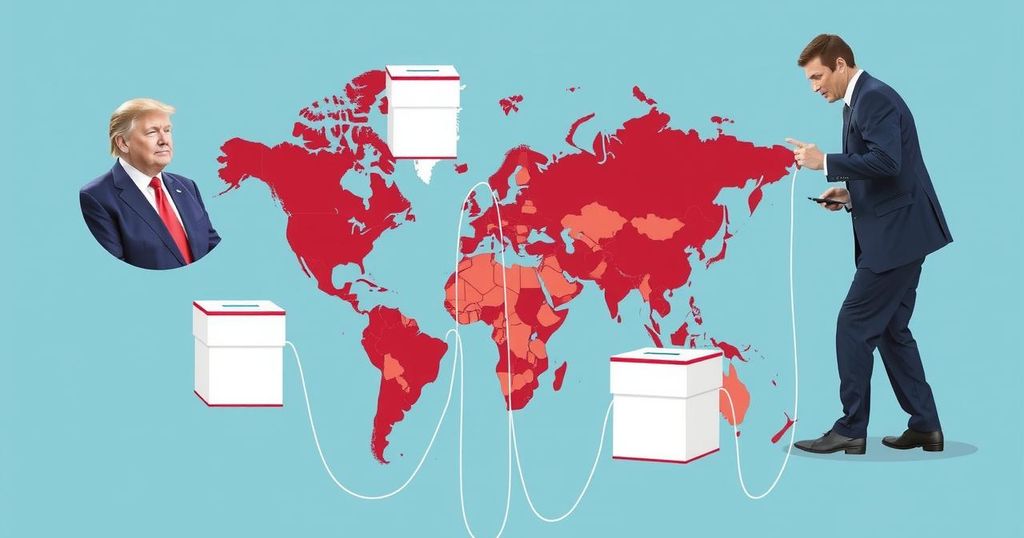World news
2024 ELECTIONS, ABC NEWS, AFRICA, ASIA, BHARATIYA JANATA PARTY, BRITAIN, DEMOCRATIC ALLIANCE, DONALD TRUMP, ELECTIONS, EUROPE, EUROPEAN UNION, FRANCE, INDONESIA, INTERNATIONAL INSTITUTE FOR DEMOCRACY AND ELECTORAL ASSISTANCE, NA, NARENDRA MODI, PARLGOV, PARLIAMENTARY SEATS, PENSION REFORM, SOUTH AFRICA, SOUTH KOREA, VOTING INTENTIONS
Marisol Gonzalez
0 Comments
Global Elections of 2024: A Turning Point for Incumbents in Democracies
The 2024 elections witnessed over 70 national polls influencing more than half of the global population, with significant losses for incumbent parties across various democracies. Rising voter dissatisfaction rooted in economic challenges contributed to these outcomes, while both conservative and progressive forces capitalized on the widespread anti-incumbent sentiment. Upcoming elections in 2025 will test the longevity of this trend.
The year 2024 marked a significant moment in global politics, with more than 70 national elections held, influencing over half of the world’s population. Major democracies such as India, the United States, Indonesia, and Bangladesh participated, alongside 27 European nations electing representatives to the European Parliament. The total ballots cast exceeded 1.6 billion, emphasizing widespread electoral engagement as reported by the International Institute for Democracy and Electoral Assistance (International IDEA).
A striking trend emerged from these elections, as incumbents in developed countries generally faced adverse outcomes, with a Financial Times article noting a significant decline in vote share for every incumbent party. This was an unprecedented occurrence, marking the first downturn in nearly 120 years of documented data by the ParlGov database. Moreover, over 80% of both affluent and less affluent democracies witnessed incumbent parties losing ground, irrespective of their political alignment.
Conservative parties made notable gains in various nations, including the United States, where Donald Trump claimed victory across battleground states. Similarly, in Portugal, the center-right Democratic Alliance experienced a surge, while far-right parties secured an unprecedented presence in the European Parliament. Conversely, opposition parties on the left capitalized on growing anti-incumbent sentiment, as seen in the UK’s parliamentary elections, where the Conservative Party suffered substantial losses. In South Korea, the Democratic Party led liberal opposition to a significant victory.
Although several incumbent parties retained power, they often did so with diminished majorities. This was evident in India, where Prime Minister Narendra Modi’s Bharatiya Janata Party lost its outright majority but maintained governance through coalition alliances. Meanwhile, nations like Japan, South Africa, and France reflected similar trends of reduced support for incumbents. In stark contrast, more autocratic regimes displayed different results. For example, in Rwanda, President Paul Kagame achieved a near-unopposed electoral win, while in Russia, President Vladimir Putin secured a disputed landslide victory.
Some signs of dissent against incumbents were perceptible even in less democratic nations, such as Bangladesh and Iran, where incumbent leaders faced electoral challenges amid public dissatisfaction. Analysts attribute these electoral swings primarily to economic grievances, particularly rising living costs. Nonetheless, Mexico demonstrated a notable exception, where Claudia Sheinbaum succeeded in the presidential race owing to favorable economic perceptions among voters.
The backdrop of continued migration issues and the socioeconomic ramifications of the pandemic have further fueled voter discontent. Polling conducted by Pew Research revealed that increasing numbers of citizens perceive democracy as an inadequate representation of their interests, contributing to a prevailing sense of alienation among the populace. Looking ahead, while 2025 is expected to feature fewer elections, the upcoming polls will be critical in determining whether the trend against incumbents persists or gives way to new dynamics.
In 2024, the global electoral landscape experienced a seismic shift as a multitude of countries participated in national elections, driven by widespread voter dissatisfaction with incumbent governments and the prevailing economic conditions. This unprecedented engagement reflected a significant moment in democracy, with voters expressing their desires for change amid various challenges, including imminent economic crises and social issues stemming from the pandemic era. The elections revealed a pattern where incumbent parties in both developed and developing countries struggled to maintain their electoral standing.
In conclusion, the 2024 elections represented a pivotal moment in democratic governance, showcasing widespread voter dissatisfaction leading to significant losses for incumbents across the globe. The simultaneous successes of conservative and progressive factions highlighted an evolving political landscape, driven by economic concerns and public discontent with traditional leadership. Future elections will be essential in assessing whether this trend against incumbents proves to be a lasting phenomenon or whether other factors will influence electoral outcomes moving forward.
Original Source: www.voanews.com




Post Comment